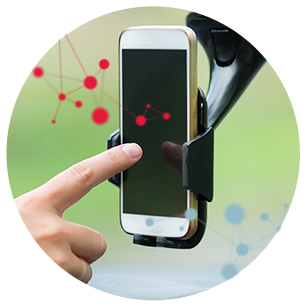 While the Netherlands is geographically small, it’s one of the most densely populated countries in the world—with more than 17 million people—and boasts one of the world’s largest economies. As the country’s population and economy continues to grow, its need for smarter, more sustainable travel grows. Adding new infrastructure is no longer a feasible option. Instead, the country is looking to drive improvements across its existing infrastructure and, in 2011, launched a nationwide program—Beter Benutten (Better Utilization)—to make its road, rail and water networks more accessible and sustainable.
While the Netherlands is geographically small, it’s one of the most densely populated countries in the world—with more than 17 million people—and boasts one of the world’s largest economies. As the country’s population and economy continues to grow, its need for smarter, more sustainable travel grows. Adding new infrastructure is no longer a feasible option. Instead, the country is looking to drive improvements across its existing infrastructure and, in 2011, launched a nationwide program—Beter Benutten (Better Utilization)—to make its road, rail and water networks more accessible and sustainable.
As part of the Better Utilization program, numerous Integrated Mobility Management Architecture (IMMA) projects have been commissioned—each focused on improving urban mobility by encouraging road users to adopt new behaviors to reduce traffic congestion. CGI is currently involved as a sub-contractor with three of those IMMA projects, partnering with prime contractor and digital native Innovactory to support the regions of Utrecht, Central Netherlands and Zuid-Limburg in implementing CGI’s digital SmartTravel solution.
How SmartTravel works
SmartTravel combines digital technologies such as mobility, gamification, big data analytics and travel mode detection to influence and reward driver behavior. The aim is to encourage drivers to change their behavior by, for example, using a bicycle instead of a car and, when using a car, traveling outside of rush hour times.
One of the unique aspects of SmartTravel is its underlying platform—Smart Trip Analytics Platform. CGI is the only company in the Netherlands with a platform that allows for multi-modal classification of trips without using additional infrastructure, such as roadside cameras or other hardware, such as dongles in cars.
Delivering value through innovation and collaboration
The ultimate goal of each IMMA project is to significantly reduce rush hour travelers per day and per region by the end of 2017 through driver behavior modification. Meeting the specific reduction targets set by each region is an ambitious undertaking because behavioral change is a complex sociological and psychological challenge. However, the advantage of SmartTravel is that it motivates users both intrinsically and extrinsically, providing rewards for making a positive contribution to traffic flow and the environment. Read our case study to learn how SmartTravel is transforming travel in the Netherlands and the value it’s delivering as a smart travel solution.




